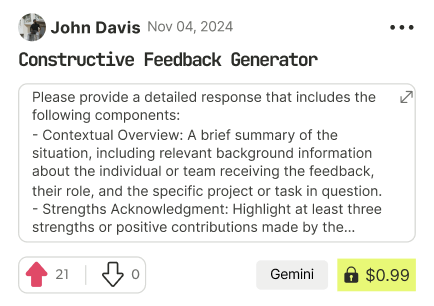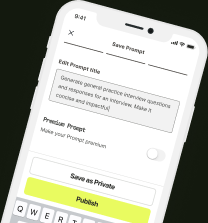prompt mine App
Find, Create & Share AI Magic
Mastering Career Growth: A Comprehensive Guide to Long-Term Success and Fulfillment
## The Ultimate Guide to Achieving General Career Growth: A Roadmap to Long-Term Success & Personal Fulfillment
Career growth isn't just about promotions; it's about continuous development, increased skills, expanded opportunities, and ultimately, a career that aligns with your values and provides personal fulfillment. This guide provides a comprehensive framework for individuals at any stage of their career, empowering them to proactively shape their professional journey.
**I. Laying the Foundation: Self-Assessment & Goal Setting**
Before you can chart a course, you need to know where you are and where you want to go. This stage is about introspection and defining your aspirations.
* **Self-Reflection:**
* **Skills Inventory:** What are you good at? List both hard skills (technical abilities, specific software knowledge) and soft skills (communication, problem-solving, teamwork). Be honest and comprehensive. Use online assessments (e.g., Gallup StrengthsFinder, Myers-Briggs) for deeper insights.
* **Values & Interests:** What genuinely motivates you? What type of work environment do you thrive in? What impact do you want to make? Consider values like creativity, challenge, autonomy, security, collaboration, and contribution.
* **Achievements & Passions:** What accomplishments are you most proud of? What projects have you found most engaging? Analyze these experiences to identify patterns and areas you want to further explore.
* **Weaknesses & Areas for Improvement:** Be realistic about your limitations. Identify skills you need to develop and areas where you struggle. This is crucial for targeted development.
* **Setting SMART Goals:** Based on your self-reflection, define specific, measurable, achievable, relevant, and time-bound career goals. Examples:
* **Short-Term (1-2 years):** "Improve public speaking skills by attending a Toastmasters course and presenting at 3 company events in the next year."
* **Mid-Term (3-5 years):** "Transition into a project management role by obtaining PMP certification and leading a project within the next 3 years."
* **Long-Term (5+ years):** "Become a thought leader in my industry by publishing articles and speaking at conferences in the next 5 years."
* **Regularly Review & Adjust:** Your goals are not set in stone. Life changes, and your aspirations may evolve. Revisit your goals every 6-12 months to ensure they still align with your values and circumstances.
**II. Mastering the Fundamentals: Skills Development & Adaptability**
Skills are the building blocks of your career. Focus on developing both technical and soft skills, with an emphasis on adaptability.
* **Identifying Transferable Skills:** These are skills applicable across different roles and industries. Examples:
* **Communication (written & verbal):** Essential for all professions. Practice active listening, clear articulation, and persuasive writing.
* **Problem-Solving:** The ability to analyze situations, identify solutions, and implement them effectively. Hone your critical thinking and analytical skills.
* **Leadership:** Influencing and motivating others, regardless of formal authority. Develop your ability to delegate, mentor, and inspire.
* **Teamwork & Collaboration:** Working effectively with others to achieve common goals. Practice empathy, conflict resolution, and consensus-building.
* **Time Management & Organization:** Prioritizing tasks, meeting deadlines, and managing your workload efficiently. Use tools and techniques like the Pomodoro Technique or Eisenhower Matrix.
* **Adaptability & Resilience:** The ability to adjust to changing circumstances and bounce back from setbacks. Embrace change, learn from failures, and maintain a positive attitude.
* **Developing Skills Strategically:**
* **Formal Education:** Consider degrees, certifications, and specialized training relevant to your field. Research reputable programs and evaluate the return on investment.
* **Online Courses & Platforms:** Platforms like Coursera, Udemy, LinkedIn Learning, and edX offer a vast array of courses on various topics. Choose courses that align with your goals and learning style.
* **On-the-Job Training:** Seek opportunities to learn new skills within your current role. Volunteer for projects, shadow colleagues, and ask for feedback.
* **Mentorship Programs:** Connect with experienced professionals who can provide guidance, support, and feedback. Seek out mentors within and outside your organization.
* **Self-Learning:** Read books, articles, and blogs related to your field. Stay updated on industry trends and technological advancements. Attend webinars and online conferences.
* **Embracing Lifelong Learning:** The world is constantly evolving. Commit to continuous learning to stay relevant and competitive. Be curious, explore new ideas, and embrace challenges.
**III. Networking: Building Meaningful Connections**
Networking is not just about collecting business cards; it's about building genuine relationships that can support your career growth.
* **Building Your Network:**
* **LinkedIn:** Optimize your profile, connect with colleagues and industry professionals, and engage in relevant discussions.
* **Industry Events & Conferences:** Attend conferences, workshops, and seminars to meet people in your field. Prepare an elevator pitch to introduce yourself concisely.
* **Professional Associations:** Join relevant professional organizations to connect with peers and access resources.
* **Informational Interviews:** Reach out to people in roles or industries you're interested in and ask for informational interviews to learn about their experiences and gain insights.
* **Volunteer Work:** Participate in volunteer activities related to your field to meet like-minded individuals.
* **Networking Effectively:**
* **Be Genuine & Authentic:** Focus on building genuine connections based on shared interests and mutual respect.
* **Provide Value:** Offer help, share resources, and contribute to conversations. Networking should be a two-way street.
* **Follow Up:** Send thank-you notes or emails after meeting someone. Stay in touch regularly to nurture your relationships.
* **Be Patient & Persistent:** Networking takes time and effort. Don't get discouraged if you don't see immediate results.
* **Leveraging Your Network:**
* **Seek Advice & Mentorship:** Ask for guidance and support from experienced professionals in your network.
* **Share Your Expertise:** Offer your knowledge and skills to help others in your network.
* **Identify Opportunities:** Your network can provide valuable insights into job openings, industry trends, and potential career paths.
**IV. Building a Strong Professional Brand:**
Your professional brand is how you are perceived by others. It's your reputation and the value you bring to the table.
* **Defining Your Brand:**
* **Identify Your Unique Value Proposition:** What makes you stand out from the crowd? What skills and experiences do you possess that are highly valuable to employers?
* **Develop a Consistent Message:** Craft a clear and concise message that communicates your value proposition and career aspirations.
* **Managing Your Online Presence:**
* **LinkedIn Profile:** Create a compelling profile that showcases your skills, experience, and accomplishments. Use keywords relevant to your industry.
* **Social Media:** Be mindful of what you post on social media. Ensure your online presence reflects your professional brand.
* **Personal Website/Blog:** Consider creating a website or blog to showcase your work and share your expertise.
* **Communicating Your Value:**
* **Elevator Pitch:** Develop a concise and compelling elevator pitch that summarizes your skills, experience, and career goals.
* **Resume & Cover Letter:** Tailor your resume and cover letter to each job application, highlighting the skills and experiences most relevant to the position.
* **Interviews:** Prepare for interviews by researching the company and the role. Practice answering common interview questions and be ready to showcase your skills and accomplishments.
* **Presentations & Public Speaking:** Develop your public speaking skills to confidently present your ideas and expertise.
**V. Navigating Career Transitions & Setbacks:**
Career growth is not always linear. Be prepared to navigate transitions, setbacks, and unexpected changes.
* **Adapting to Change:**
* **Embrace New Technologies & Trends:** Stay updated on the latest advancements in your field and be willing to learn new skills.
* **Be Open to New Roles & Responsibilities:** Don't be afraid to step outside your comfort zone and take on new challenges.
* **Network with Professionals in Different Fields:** Expand your network to gain insights into different industries and potential career paths.
* **Overcoming Setbacks:**
* **Learn from Mistakes:** View failures as opportunities for growth. Analyze what went wrong and identify areas for improvement.
* **Seek Support:** Talk to friends, family, mentors, or career counselors for support and guidance.
* **Maintain a Positive Attitude:** Focus on your strengths and accomplishments, and don't let setbacks derail your long-term goals.
* **Develop Resilience:** Cultivate the ability to bounce back from adversity. Practice mindfulness, gratitude, and self-care.
* **Planning for Career Transitions:**
* **Identify Your Skills & Interests:** Reassess your skills and interests to determine what types of roles and industries align with your values and aspirations.
* **Research Different Career Paths:** Explore different career options and research the skills, education, and experience required for each path.
* **Network with Professionals in Your Target Industry:** Connect with people working in your desired industry to learn about their experiences and gain insights.
* **Gain

Find Powerful AI Prompts
Discover, create, and customize prompts with different models, from ChatGPT to Gemini in seconds

Simple Yet Powerful
Start with an idea and use expert prompts to bring your vision to life!

